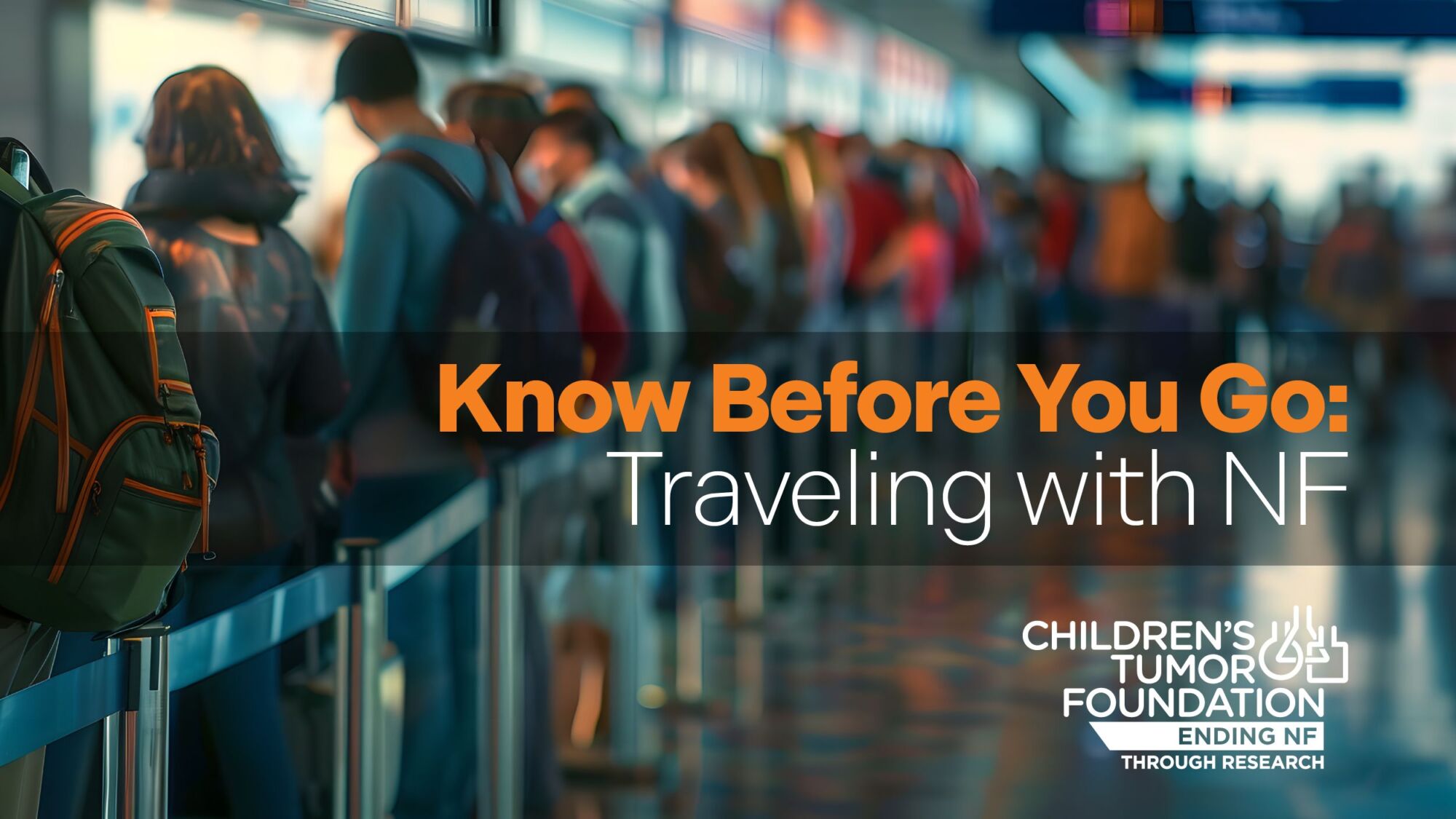Traveling with a condition like NF can bring unique challenges, especially when navigating airport security and boarding. Whether you have neurofibromatosis type 1 (NF1), schwannomatosis (SWN), or NF2-related schwannomatosis (NF2-SWN), visible tumors or other signs of NF might lead to uncomfortable questions or situations during TSA screenings or while boarding. To help you prepare for your journey and ensure a smoother experience, here are some helpful tips.
1. Understanding TSA Screening Procedures
Before you arrive at the airport, it’s important to be familiar with TSA screening procedures, especially if you have visible tumors or other signs of NF, are deaf or hard of hearing, or need special assistance. TSA requires all passengers and their belongings to undergo security screening. Here’s what you need to know:
- TSA Notification Card: You can inform the TSA officer of your condition by using the TSA Notification Card. This card discreetly communicates your medical condition without explaining it in detail. You can download and print this card from the TSA website.
- Additional Screening: If you have a support appliance, such as a brace or prosthesis, you may require additional screening if it alarms in the Walk Through Medical Detectors (WTMD) or AIT (read more below). Additional screening may include a pat-down, swabbing the device and/or your hands, or a metal detector wand.
- Advanced Imaging Technology (AIT): If you can stand and walk unassisted, you may be eligible for screening through the body scanner. This method is often quicker and less invasive than a pat-down, though light jackets may need to be removed.
- Pat-Downs: If you prefer not to use the AIT or cannot do so, you may have to have a pat-down. These are conducted by an officer of the same gender and may involve removing shoes, belts, or light jackets. While it can feel intrusive, remember that you can ask for the pat-down to be done in a private area if that makes you more comfortable.
2. Communicating with TSA Officers
It’s essential to communicate your needs to the TSA officers. Here’s how to approach it:
- Speak Up: Don’t hesitate to inform the TSA officer about NF. You can do this verbally, through the TSA Notification Card, or by showing medical documentation. Be polite but assertive in explaining that your condition is not contagious and does not pose any health risk to others.
- Traveling Companion or Assistance: If you are traveling with a companion, they can assist you during the screening. However, they may need to undergo rescreening afterward. You may also get assistance from someone not also traveling with you by requesting a gate check pass from your airline. Likewise, if you need wheelchair assistance through security, this is a free service available to you. Contact your airline during booking or before your flight.
- Request Accommodations: If you feel uncomfortable or if something during the screening process isn’t working for you, ask for accommodations. TSA officers are trained to work with passengers who have medical conditions and disabilities, so don’t be afraid to request what you need.
3. Boarding
- Individuals with disabilities who need extra time may board early. This is an important time to inform personnel of any NF-related sight, hearing, or mobility issues that may impact their ability to follow instructions in an emergency.
- Proactively sharing information with flight attendants about the visible or invisible aspects of your NF may also help avoid uncomfortable questions.
4. Preparing for Potential Challenges
Unfortunately, individuals with NF may sometimes face scrutiny due to the sometimes visible nature of their condition. Here are some tips to prepare for and manage these situations:
- Stay Calm and Confident: If questioned about your tumors or other signs of NF, calmly explain that they are related to NF, a non-contagious genetic condition. You can also carry a letter from your doctor, which may help clarify any misunderstandings.
- Know Your Rights: You have the right to privacy and respectful treatment during the screening process. If you feel you’re being treated unfairly or insensitively, politely ask to speak with a supervisor. You can also submit your concern(s) or a complaint to the TSA Contact Center.
- Plan Ahead: Allow extra time at the airport to account for any delays during screening. Being prepared can help reduce stress and give you the confidence to handle any unexpected situations.
5. Additional Resources
If you’d like more information or need additional support while traveling, here are a few resources that might help:
- TSA Cares: This helpline provides additional assistance during the security screening process for travelers with disabilities, medical conditions, and other special circumstances. You can request support 72 hours before your flight by calling (855) 787-2227 or submitting an online form.
- TSA PreCheck®: Consider enrolling in TSA PreCheck®, which allows for expedited screening and reduces the need to remove shoes, laptops, and other items. It’s a convenient option for frequent travelers with NF.
- Make Use of Apps: Download the mobile app from your airline to keep up with updates and any last-minute changes.
- Children’s Tumor Foundation: The Children’s Tumor Foundation offers a free business-sized card that contains a definition of NF and an explanation that NF manifestations are not contagious but might be painful. While this card does not replace the official TSA Notification Card, it might be helpful to carry it with you as an additional resource. Request copies here. You may also download this image to your mobile device or click here to print the information on your home computer. Visit our Resource Library for more sharable information about NF.
Final Thoughts:
Traveling with NF doesn’t have to be stressful. With a bit of preparation and understanding of TSA procedures, you can ensure a smoother experience. Remember that the TSA serves a very important role and their primary job is to keep everyone safe. Remember to have understanding, communicate your needs, stay calm, and know that you have the right to respectful treatment. Safe travels!


